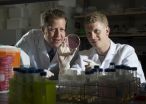(Press-News.org) Humans are extremely choosy when it comes to mating, only settling down and having kids after a long screening process involving nervous flirtations, set-ups by friends, online matchmaking sites, awkward dates, humiliating rejections, hasty retreats and the occasional lucky strike. In the end, we "fall in love" and "live happily ever after." But evolution is an unforgiving force - isn't this choosiness rather a costly waste of time and energy when we should just be "going forth and multiplying?" What, if anything, is the evolutionary point of it all? A new study may have the answer.
Doing a cost/benefit analysis of love is a challenging business, with many potential confounds, and - in the case of humans - some ethical limitations on doing experiments. A new study publishing on September 14th in the Open Access journal PLOS Biology by Malika Ihle, Bart Kempenaers, and Wolfgang Forstmeier from the Max Planck Institute for Ornithology, Seewiesen, Germany, describes an elegant experiment designed to tease apart the consequences of mate choice.
The authors took advantage of the fact that the zebra finch shares many characteristics with humans, mating monogamously for life, and sharing the burden of parental care. Female finches choose mates in a way that is specific to the individual, and there is little consensus among females as to who the cutest male is.
Using a population of 160 birds, the authors set up a speed-dating session, leaving groups of 20 females to choose freely between 20 males. Once the birds had paired off, half of the couples were allowed to go off into a life of wedded bliss. For the other half, however, the authors intervened like overbearing Victorian parents, splitting up the happy pair, and forcibly pairing them with other broken-hearted individuals.
Bird couples, whether happy or somewhat disgruntled, were then left to breed in aviaries, and the authors assessed couples' behavior and the number and paternity of dead embryos, dead chicks and surviving offspring.
Strikingly, the final number of surviving chicks was 37% higher for individuals in chosen pairs than those in non-chosen pairs. The nests of non-chosen pairs had almost three times as many unfertilized eggs as the chosen ones, a greater number of eggs were either buried or lost, and markedly more chicks died after hatching. Most deaths occurred within the chicks' first 48 hours, a critical period for parental care during which non-chosen fathers were markedly less diligent in their nest-care duties.
Watching the couples' courtship showed some noticeable differences - although non-chosen males paid the same amount of attention to their mates as the chosen ones did, the non-chosen females were far less receptive to their advances, and tended to copulate less often. An analysis of harmonious behavior revealed that non-chosen couples were generally significantly less lovey-dovey than the chosen ones. There was also a higher level of infidelity in birds from non-chosen pairs - interestingly the straying of male birds increased as time went by while females roamed less.
Overall the authors conclude that birds vary rather idiosyncratically in their tastes, and choose mates on the basis that they find them stimulating in some way that isn't necessarily obvious to an outside observer. This stimulation "turns on" the females to increase the likelihood of successful copulation and encourages paternal commitment for the time needed to raise young; together these maximize the couple's likelihood of perpetuating their genes through their thriving offspring.
Sounds familiar? This is presumably what the human dating game is about, the need perhaps exacerbated by the extended phase of dependence during which our children need parental support. Indeed, these authors' results are consistent with some studies on the differences between love-based and arranged marriages in human society.
INFORMATION:
Please mention PLOS Biology as the source for this article and include the links below in your coverage to take readers to the online, open access articles.
All works published in PLOS Biology are open access, which means that everything is immediately and freely available. Use this URL in your coverage to provide readers access to the paper upon publication:
http://www.plosbiology.org/article/info:doi/10.1371/journal.pbio.1002248
Contact:
Dr Malika Ihle
Max Planck Institute for Ornithology
Behavioural Ecology & Evolutionary Genetics
82319 Seewiesen, Germany
Tel. +49 815 7932 310
Fax +49 815 7932 400
Malika_ihle@hotmail.fr
Dr Wolfgang Forstmeier
Max Planck Institute for Ornithology
Behavioural Ecology & Evolutionary Genetics
82319 Seewiesen, Germany
Tel. +49 815 7932 346
Fax +49 815 7932 400
Forstmeier@orn.mpg.de
Citation: Ihle M, Kempenaers B, Forstmeier W
(2015) Fitness Benefits of Mate Choice for
Compatibility in a Socially Monogamous Species.
PLoS Biol 13(9): e1002248. doi:10.1371/journal.
pbio.1002248
Funding: The authors received no specific funding for this work.
Competing Interests: The authors have declared that no competing interests exist.
MRSA is bad news. If you've never heard of it, here's what you need to know: It's pronounced MER-suh, it's a nasty bacterial infection and it can cause serious disease and death.
Senior molecular biology major Jacob Hatch knows MRSA as the infection that took his dad's leg.
Hatch was thousands of miles away on an LDS (Mormon) mission when Methicillin-Resistant Staphylococcus aureus decalcified the bones in his dad's foot and lower leg, leading to an emergency amputation just below the knee.
"It was really hard to hear the news--you never expect to hear someone in ...
Irvine, Calif., Sept. 14, 2015 -- University of California, Irvine researchers with the School of Medicine have identified the mechanism by which valproic acid controls epileptic seizures, and by doing so, also revealed an underlying factor of seizures.
Valproic acid is widely used to treat various types of seizure disorders, but to this point, the cellular mechanism affected by its anticonvulsant properties were not well understood.
Dr. Naoto Hoshi, an associate professor of pharmacology and physiology & biophysics, and colleagues discovered that valproic acid preserved ...
Athens, Ga. - Microbiology researchers at the University of Georgia studying a soil bacterium have identified a potential mechanism for neurodegenerative diseases.
A role for the protein HSD10 had been suspected in patients with Alzheimer's disease and Parkinson's disease, but no direct connection had previously been established. This new breakthrough suggests that HSD10 reduces oxidative stress, promotes cell repair and prevents cellular death.
The authors first discovered that an enzyme related to HSD10, CsgA, produces energy during sporulation in the bacterium ...
A new review has produced the most conclusive evidence to date that people consume more food or non-alcoholic drinks when offered larger sized portions or when they use larger items of tableware. The research, carried out by the University of Cambridge and published in the Cochrane Database of Systematic Reviews, suggests that eliminating larger-sized portions from the diet completely could reduce energy intake by up to 16% among UK adults or 29% among US adults.
Overeating increases the risks of heart disease, diabetes, and many cancers, which are among the leading causes ...
Single grandparents raising grandchildren are more vulnerable to poor physical and mental health than are single parents, according to a study recently published in Current Gerontology and Geriatrics Research.
These caregivers may be at greater risk for diminished physical capacity and heightened prevalence of depression, researchers found.
Researchers at Georgia State University and the University of Toronto found that solo grandparents caring for grandchildren fare worse than single parents across four critical health areas: physical health, mental health, functional ...
SAN FRANCISCO--After analyzing the seismic waves produced by small underground chemical explosions at a test site in Vermont, scientists say that some features of seismic waves could be affected by the amount of gas produced in the explosion.
This unexpected finding may have implications for how scientists use these types of chemical explosions to indirectly study the seismic signal of nuclear detonations. Researchers use chemical blasts to learn more about the specific seismic signatures produced by explosions--which differ from those produced by earthquakes--to help ...
A new guideline that aims to prevent fractures in residents of long-term care facilities is targeted at frail seniors and their families as well as health care workers. The guideline, published in CMAJ (Canadian Medical Association Journal), was developed with input from residents of long-term care facilities and their families, as well as researchers and health care professionals.
Seniors living in long-term care homes have a two- to four-fold risk of sustaining a fracture such as a hip or spinal fracture, compared with adults of similar age living in the community. ...
Scientists have identified a gene - FOXC1 - that, if switched on, causes more aggressive cancer in a fifth of acute myeloid leukaemia (AML) patients, according to a Cancer Research UK study* published in the journal Cancer Cell, today.
The FOXC1 gene is normally switched on during embryonic development and is needed to turn cells into specialised tissues, like the eyes, kidney, brain and bone.
But this new research found that in certain patients with AML - a type of blood cancer that affects white blood cells and the bone marrow - this gene was wrongly switched on inside ...
(BOSTON) - Stem cell therapies are often limited by low survival of transplanted stem cells and the lack of precise control over their differentiation into the terminal cell types needed to repair or replace injured tissues. Now, a team led by Wyss Institute Core Faculty member David Mooney, Ph.D., has developed a new strategy - embedding stem cells into porous, transplantable hydrogels - that has experimentally improved bone repair by boosting the survival rate of transplanted stem cells and influencing their cell differentiation.
Mooney - who is also the Robert P. Pinkas ...
(Boston)--A panel of experts and researchers have developed a new classification system for gout, the most common form of inflammatory arthritis. This new system standardizes the classification of this condition using a variety of evidence-based criteria.
Led by a researchers at Boston University School of Medicine (BUSM) and institutions from around the world, the study is a joint publication appearing in two journals simultaneously, Annals of Rheumatologic Disease and Arthritis & Rheumatology.
Gout is characterized by the deposition of a specific type of crystal in ...

